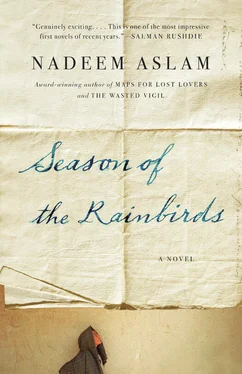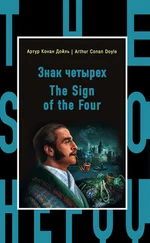
The sergeant lowered the book he was reading. The chair was tipped back on two legs. On the wall where his head rested the plaster was worn and grimy. He brought down the chair and, sighing, pressed the book to his chest where Wamaq Saleem’s signature was tattooed. ‘How can they let us have his books for money alone?’ He left the chair and went to stand in the doorway. Above the door hung a framed document, listing the ten qualities — each expressed by an adjective — considered to be the essence of an ideal policeman.
The police inspector was reading the newspaper. ‘Were you patrolling last night?’ he asked from behind the paper.
Mosquitoes cruised around the room, silently for the most part; only occasionally was the keening of a female to be heard. The floor was caked with mud brought in on people’s shoes. ‘No. It was my turn as barracks orderly.’ He smiled: ‘I did patrol the night before last, though.’
The tone of voice had betrayed the smile: the inspector lowered the newspaper and looked at the sergeant.
The sergeant brought his foot down on a water lizard then, without looking, sent the creature flying with an economical kick. It landed on its ribbed back, split from end to end and scraping the air uselessly with its legs like a wind-up toy that has been knocked over.
Mr Kasmi was at the other side of the courthouse, nimbly stepping around the puddles. The sergeant had seen Mr Kasmi often enough before on his way to Yusuf Rao’s office. But today was Friday, and the sergeant realised that Mr Kasmi was walking towards the barracks.
‘It’s about the post office,’ Mr Kasmi said. ‘I would like to know how long the postal system in this town is to remain in paralysis. I have a letter to post.’
The police inspector leaned forward and rested his hands on the desktop, fingers slatted into each other. ‘It won’t be long, Kasmi-sahib. I think by the middle of next week the DC will have informed the central post office of the vacancy. And soon after that the new postmaster should arrive.’
The sergeant had gone back to his chair. He was hanging on the insistent drone of a mosquito. He followed the insect’s erratic flight, his eyes doodling, and when the whine stopped he stiffened and smacked his forearm. There was a smear of blood on the skin. ‘What a waste,’ he grinned. ‘My own blood.’
The inspector smiled. ‘Have it tattooed in.’
His subordinate smiled back. Then he got to his feet and brought his book to Mr Kasmi, a forefinger pressed firmly into the page. ‘What does this word mean, Kasmi-sahib?’
Mr Kasmi raised a finger in the air. ‘It’s a Persian word.’ He told the sergeant what the word meant. ‘When Wamaq Saleem began writing poetry, in his student days, he didn’t know any Persian. That, of course, was a great disadvantage since our language draws so heavily from Persian. So he had to learn it.’
The sergeant, nodding vigorously, went back to his chair.
Mr Kasmi cleared his throat and turned to the police inspector. ‘And what are we citizens supposed to do until then?’
The inspector scratched his head. ‘Leave the letter with me, Kasmi-sahib. I’ll have it sent to the city.’
‘I don’t understand why the post office is shut, anyway,’ Mr Kasmi said. ‘The postmaster may have gone missing but the post man is still here. Why not get him to take charge until a new postmaster can be appointed?’ And he said to himself: ‘I’ll suggest this to Azhar.’
The police inspector allowed a little irritation in his voice. ‘You’ll have to wait till the end of next week, Kasmi-sahib. The DC’ll be away for some time. Ever since the attempt on the General’s life there have been emergency meetings everywhere.’
Mr Kasmi nodded.
‘I myself was away all day yesterday,’ said the police inspector. ‘There are plans now to enlarge the barracks. More men and a larger lock-up. It will be a proper police station.’ There was pride in his voice. At that he let the matter drop and exclaimed: ‘Where are my manners? Would you like a cup of tea, Kasmi-sahib?’ And ignoring Mr Kasmi’s refusal, he clicked his fingers at the sergeant; but he was already rushing to the tea-stall across the street.

The loudspeaker of the mosque growled, frightening away the papihas, and after the prolonged note of the feedback-whistle, a male voice began to recite verses from the Qur’an.
Yusuf Rao’s twelve-year-old son sat cross-legged on the floor cleaning his father’s weekday shoes. He had taken out the laces and was using the handle of a spoon to prise out rectangles of caked mud from the pattern on the sole. From the courtyard high-pitched yelps and urgent commands — sound of his brothers and sisters at play — reached the room. Yusuf Rao was at the other side of the room engaged in a conversation with Mr Kasmi. The Little Green Book was on the table by Yusuf Rao’s elbow.
Mr Kasmi said, ‘I think you should lie low for a while.’
Yusuf Rao picked up the Little Green Book; he held it in his hand for a moment before returning it to the table. ‘They won’t come for me. I think they know that I gave all that up years ago.’
‘But there’s no harm in being careful,’ Mr Kasmi said in his precise way. ‘Did you hear about Saif Aziz?’
‘Yes,’ Yusuf Rao replied. ‘I think he was very wise. I would’ve done the same if I was still active. The repression’s bound to increase.’ He broke off and, a smile on his face, asked: ‘Did Saif Aziz tell you how Mujeeb Ali’s brother, after he became a minister, tried to buy him? No? Well, he sent a brand new Volkswagen round to his house with a note saying, It’s a gift, I know it’s your favourite car. Saif Aziz sent it back saying, My favourite car is a Mercedes-Benz; a Volkswagen is what I can afford .’
Mr Kasmi smiled. ‘Did he get a Mercedes-Benz?’
Yusuf Rao made a theatrical sour face. ‘Much cheaper to shut the whole paper down.’
Yusuf Rao’s youngest daughter entered the room. She wore a bright blue frock and her long straight hair was gathered with a ribbon; the fringe was held away from the forehead with a dragonfly hair-clip. She was holding a large peepul leaf in her hand. Mr Kasmi lifed her on to his lap and began skilfully to fold the supple leaf.
‘I wonder who fired the missile?’ Mr Kasmi said.
‘The BBC said it was the hanged prime minister’s son. But according to the All India Radio it was the guerrillas from Baluchistan,’ said Yusuf Rao. And he added grimly: ‘I don’t envy whoever comes to power in the wake of this regime.’
Mr Kasmi almost interrupted him. ‘I wish we could find out who actually runs this country. The army? The politicians? The industrialists? The landowners?’ He had stopped work on the peepul leaf to say this: the little girl poked him in the ribs, prompting him to continue.
Yusuf Rao smiled and referred to the voices from the mosques. ‘Or is it God?’
The boy had wiped the mud off the shoes and was about to begin polishing them. ‘No,’ Yusuf Rao said across the room. ‘The smell gives me a headache. Take them somewhere else.’
The boy sighed with annoyance and left the room. Mr Kasmi pointed to the mud he left behind and made a comment about the weather.
When the leaf had been securely folded into a whistle, Mr Kasmi held one end of the neat package between his lips and gently breathed into it: there was free passage of air. The child was already on her feet. She muttered a word of thanks when the whistle was handed to her, and blew into it immediately. The sharp rasping noise startled the adults. Mr Kasmi looked abashed. She went out with skipping steps, her eyes glowing with delight.
Читать дальше













